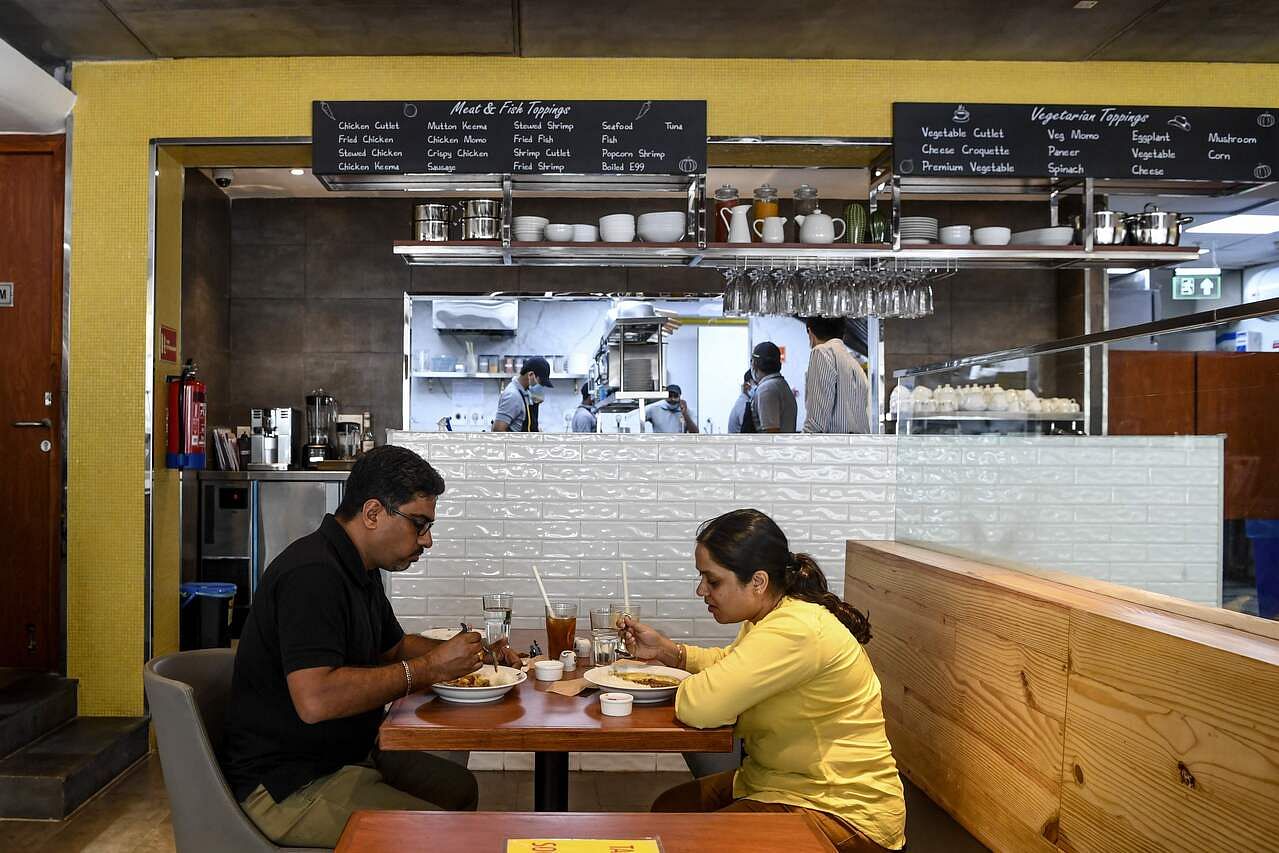NEW DELHI - Mr Tamotsu Nomura and his colleagues at CoCo Ichibanya, a chain specialising in Japanese-style curry rice, are up against a stiff challenge.
Not only do they do have to get Indians hooked on Japanese curry, they also have to do so at a time when consumers in India are wary of eating out amid the raging Covid-19 pandemic.
Yet, they took the plunge.
CoCo Ichibanya opened India's first restaurant dedicated to Japanese curry in Gurugram, a Delhi suburb, in August - a rare bold move for India's restaurant industry that is yet to recover from the impact of the pandemic's whiplashes.
"I cannot say it is a good time (to open the restaurant). We had no choice other than opening in the Covid-19 situation," said Mr Nomura, the director of Ichibanya India.
The original plan was to open in March and most of the construction had been completed before a nationwide lockdown began on Mar 25.
"We knew there were people who were longing for us to open," he added.
While restaurants were allowed to reopen in June, footfall still remains low across establishments.
CoCo Ichibanya averaged around 58 orders a day in August; most of them were dine-ins.
The response has been more enthusiastic from the sizeable Japanese expatriate community in and around Delhi, who crave the familiar taste of the popular Japanese dish, rather than Indians who remain mostly unaware of Japanese curry and even view it with scepticism.
Yet, Mr Nomura hopes Indians will take a liking to the popular Japanese household dish. "Our concept is bringing the curry back to its home as a transformed Japanese curry. We want Indian people to love it as a Japanese food," he said.

It is believed the culinary tradition of Japanese curry originated when British traders and cooks introduced the "curry" spice mix to Japan in the 19th century.
Mr Lohit Chand Mangkhom, a 26-year-old cosmetics business entrepreneur, who tasted it for the first time on a visit to CoCo Ichibanya this week, said it felt "familiar", tasting like some curries from back home in Manipur. "It also reminds me of the kidney bean curry they served at my school hostel in Assam," he added.
Besides launching a brand awareness campaign in the coming weeks, CoCo Ichibanya, like many other restaurants, is doing all it can to draw out customers and reassure them of a safe eating experience.
On top of the usual temperature checks and getting customers to use hand sanitisers, CoCo Ichibanya has replaced its physical menus with virtual ones that can be downloaded on to a customer's phone. Its seating capacity of 60 has also been halved to ensure physical distancing.
Hygiene today, more than ever before, has become an integral part of restaurants' public outreach.

Cafeteria and Co, another restaurant in the same complex as CoCo Ichibanya, brandishes its hygiene protocol on a placard placed at its entry, including features such as UV sanitisation of cutlery and dishes as well as an additional packaging layer for food delivery.
Dhaba, another restaurant, even lists the body temperature of its employees.
But even such measures have proved inadequate to draw out those like Mr John George, a 37-year-old who is preparing for the Graduate Management Admissions Test.
He was at CoCo Ichibanya on Sept 24 to pick up his order. "Since the lockdown, I haven't eaten outside. Even when I order, I treat the packaging with caution and reheat the food," he said.
While Mr Nomura thinks it could take a year for business to attain expected normal levels, the good news is that the food delivery industry has clawed back to around 85 per cent of the pre-Covid gross merchandise value, according to a Sept 23 blog post by Zomato, a popular food delivery platform in India.
Sushi and More, a Japanese chain dedicated entirely to takeaways and delivery, launched its sixth outlet in India last month amid this rebound.
Its sales recovered from zero between mid-March and May to around 45 per cent of pre-Covid levels in June. This went up further to 90 per cent this month.
"The business is coming back really strongly," said Mr Harry Hakuei Kosato, the founder of the chain. On Sept 6, it recorded its highest single-day sales since its launch in May 2011.
Yet, there were times amid the lockdown when he thought of throwing in the towel.
One such occasion was when seven of his employees from his outlets in Mumbai quit in a single day to return home. But the thought of giving up on his customers, who accounted for 80,000 meals last year, as well as his long-term commitment to doing business in India, held him back.
"If we were to close, our customers would not be able to get their fix of sushi, something light, healthy and Japanese," Mr Kosato added.
The restaurant business, which accounted for an annual revenue of 4.23 trillion rupees (S$79 billion) in 2018-19, has been among those worst hit by the pandemic.
"We would be very, very lucky if as an industry we are able to do even 20 per cent of our erstwhile annual business this financial year," said Mr Anurag Katriar, the president of the National Restaurant Association of India.
He has had to shut six of his 27 business establishments and lay off as many as 400 employees. Restaurants in Mumbai, where most of his establishments are based, are still not allowed to reopen and earnings for his firm have been nearly non-existent since March.
"It is massive, it is an existential crisis," he told The Straits Times.
Mr Katriar estimates that anywhere between 20 to 30 per cent of restaurants may never open again and that it could take another three quarters for businesses to return to pre-pandemic levels.

Yet, amid this crisis, many businesses have reinvented themselves to survive by focusing entirely on delivery and takeaways, including do-it-yourself food kits.
Chefs have also turned their homes into cloud kitchens to tap the demand for restaurant-like food.
It is also an opportunity, argues Mr Katriar, to cut down on the "extra fat" in the industry such as by trimming ostentatious menus that add more to expenses than revenue.
"When businesses are running, you never sit back and look at the girth that accumulates over the years. But now, we all have to re-imagine our businesses. This is the time of going asset-light and low risk completely," he added.












